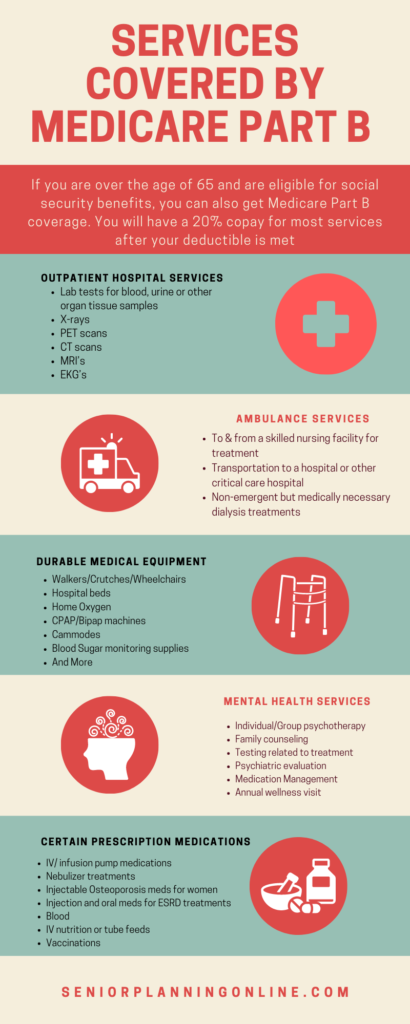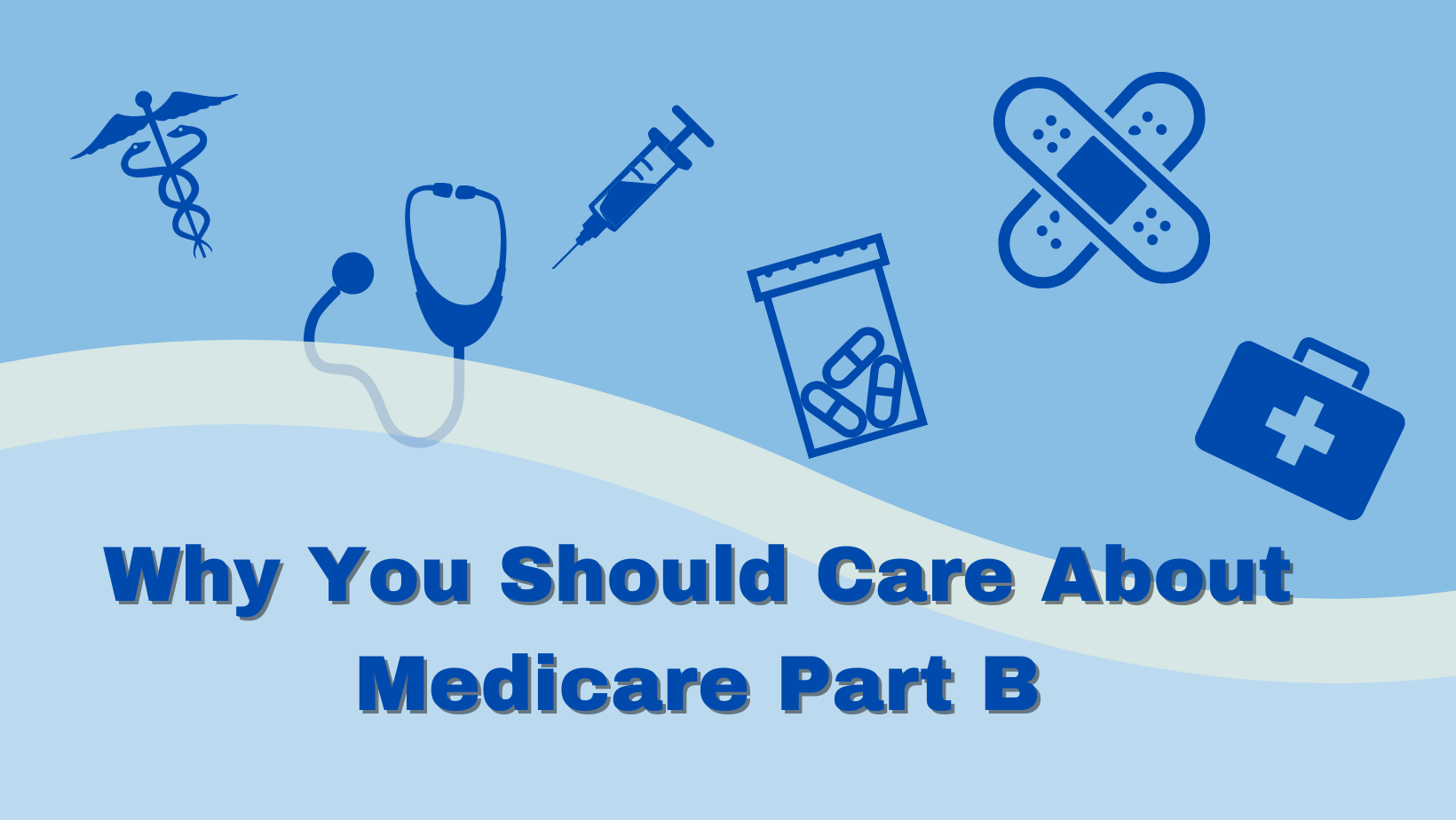Medicare insurance coverage has multiple types of benefits.
If you are over the age of 65 and are eligible for social security, you are automatically eligible for Medicare Part A and are often automatically enrolled.
Then you can choose Medicare Part B and/or Medicare Part D and/or a supplemental Medicare plan. You can mix and match!
If you need a review and brief summary of the different parts of Medicare: Medicare Part A, Medicare Part B, Medicare Part D etc, make sure you head over to my post “What No One Tells You About Medicare Enrollment Period”.
In the post Services Covered by Medicare Part A we talked about what is covered under Medicare Part A.
So what is covered under Medicare Part B?
Services Covered by Medicare Part B
Medicare Part B covers medically necessary services, supplies and equipment to treat a Medicare approved medical condition. It also helps pay for preventative treatment.
Here are the specifics:
Outpatient Hospital Services
Outpatient hospital services include diagnostic testing and treatment services you may receive as an “outpatient or observation” status if you admitted to a hospital.
This may include:
- Lab tests for blood, urine or other organ tissue samples
- X-rays
- PET scans
- CT scans
- MRI’s
- EKG’s
In general it should help cover the cost of any testing that is medically necessary to determine your treatment.
Again, you usually pay 20% of the cost after your deductible is met.
Ambulance Services
Part B can help pay for ground medical transportation. However, it must be medically indicated as necessary to qualify.
Examples of this include:
- To and from a skilled nursing facility for treatment
- Transportation to a hospital or other critical care hospital (LTAC)
- Non-emergent but medically necessary dialysis treatments
You will typically have a 20% co-pay for these services after your deductible is met.
Durable Medical Equipment
Part B can also help cover medically necessary medical equipment. There is a long list of things that it can cover. For more details, head over to the post on “A List of Medical Supplies and How you Can Get Them”.
Mental Health
Medicare Part B may pay for some of your mental health care.
It can help cover 20% of the mental health services you may have received from doctors or other providers while you were hospitalized.
It also helps cover some outpatient mental health expenses such as:
- Individual or group psychotherapy
- Family counseling with focus on your treatment
- Testing related to your treatment and ensuring it is working
- Psychiatric evaluation
- Medication Management
- A yearly wellness visit with your doctor to review your mental health needs
Specific prescription drugs
Does Medicare Part B cover prescription drugs? Yes, to a limited extent.
Below are some of the prescription drugs it may cover.
- IV medications that require an infusion pump
- Medications that are infused through a nebulizer machine
- Injectable Osteoporosis medications for women
- Erythropoietin injection needed to treat anemia if you have End Stage Renal Disease
- Blood clotting injections if you have hemophilia
- Oral End-Stage Renal Disease (ESRD) medications
- IV nutrition or tube feeding supplies
- IVIG provided in the home (the drug only)
- Regular Vaccinations (including COVID-19 vaccinations)
- Transplant and immunosuppressive medications for organ transplants

Medicare Part B Enrollment
Although you may be automatically enrolled in Medicare Part A benefits if you meet eligibility criteria, you may NOT automatically be enrolled in Medicare Part B.
You MAY be automatically enrolled in Medicare Part B if you meet the following criteria:
- You receive benefits from social security at least 4 months before you turn 65
- You receive Railroad Retirement Board (RRB) at least 4 months before you turn 65
- If you receive Disability benefits from Social Security for 24 months
- You receive certain disability benefits from the Railroad Retirement Board (RRB) for 24 months
- You receive disability benefits for ALS
If your prescription drug is not listed above, you will likely need to consider getting a prescription plan. Also known as Medicare Part D.
Do I have to Apply for Medicare Part B?
If you don’t meet the criteria above, you will not be automatically enrolled in Medicare Part B.
You don’t HAVE to apply for Medicare Part B benefits if you don’t want to or if it doesn’t benefit you.
If you are still employed, you may choose to keep your employer’s insurance and forego the Medicare Part B. Or maybe you have coverage through your spouse who is still working.
If you receive VA benefits and are highly service connected, you may not need Medicare Part B services.
Additionally some decide not to sign up for Medicare Part B if they have Tricare for life insurance that covers the same services Medicare Part B does.
There are many reasons why you may not want to sign up for Medicare Part B services.
However, if you choose not to enroll in Medicare Part B when you are first eligible, you may be to pay a late enrollment penalty. Additionally if you decide you want Medicare Part B later, you may end up with a gap in your coverage.
Check out Medicare website about the Part B Late Enrollment Penalty.
Is Medicare Part B Free?
So you have been working hard for years! You have been paying your social security tax and your Medicare tax and all of the taxes!
The point of Medicare was for you to have free health insurance when you retire right? After all you have been paying into it for years, now it’s time to have free healthcare.
Unfortunately that is a common misconception. And it is 100% INCORRECT.
Medicare Part A was funded for you through your taxes, but Medicare Part B was only partially funded. There is a monthly premium associated with your Medicare Part B benefits.
Ho Hum.
Additionally, it may not be the same amount each year AND it is dependent on your yearly tax returns.
Here is the breakdown chart from Medicare.gov’s website:
| If your yearly income in 2019 (for what you pay in 2021) was | |||||||
|
File individual tax return |
File joint tax return |
File married & separate tax return | You pay each month (in 2021) | ||||
|
$88,000 or less |
$176,000 or less |
$88,000 or less | $148.50 | ||||
|
above $88,000 up to $111,000 |
above $176,000 up to $222,000 |
Not applicable | $207.90 | ||||
|
above $111,000 up to $138,000 |
above $222,000 up to $276,000 |
Not applicable | $297.00 | ||||
|
above $138,000 up to $165,000 |
above $276,000 up to $330,000 |
Not applicable | $386.10 | ||||
|
above $165,000 and less than $500,000 |
above $330,000 and less than $750,000 |
above $88,000 and less than $412,000 | $475.20 | ||||
|
$500,000 or above |
$750,000 and above |
$412,000 and above | $504.90 |
Medicare Assistance Programs
Depending on your income threshold and if you qualify for your state’s Medicaid program. If you qualify for your state’s Medicaid program, you may also qualify for Medicare premium assistance.
Check out the Resources Page to get links of your State’s Medicaid program.
Questions?
I’ve been dealing with Medicare and Medicaid services for over 10 years. There are a lot of ins and outs. If you have any questions or would like to talk to me further about your situation, please send me an email!


No responses yet